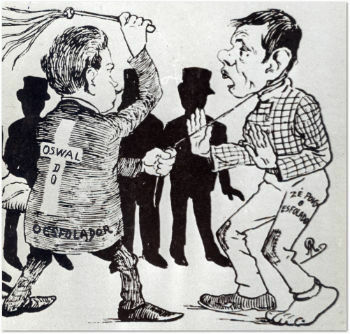We know that the Protestant Reformations unleashed a series of repercussions, initially in Europe and then in other regions of the world. Such repercussions were not only on the religious plane, but also spread throughout the land political and military, generating successive social crises and civil wars that spanned the 16th century and XVII. Luther, who began to undertake his criticisms of the Church in 1517, was the figure who inspired many sectors of society, especially in the German principalities.
One of the first moments of tension caused by Luther's ideas was the “Knights Revolt" and the "Peasants' Revolt”, which had, in addition to adapting to the reformist position, an orientation Anabaptist. Anabaptism was a sect whose main characteristic was the rejection of baptism at an infant age. The sect claimed that individuals should be baptized in adulthood, as they would be able and mature to do so. The Anabaptists soon joined the Lutheran movement as they saw it as an allied force in subverting Catholic premises.
The main Anabaptist proposal consisted in claiming the egalitarian model of apostolic age. With that, they aimed to share the riches that were in the possession of wealthy aristocrats and also of clerics. This claim came initially from nobles of low social prestige, that is, knights who had neither property nor inheritance of large values.
Do not stop now... There's more after the advertising ;)
In the year 1522, the knights organized a revolt against the high nobility and the clergy, inspired by Luther and Anabaptism. The actions of the rebels included the invasion of private properties and their distribution to the peasants. Martin Luther readily spoke out about the revolting actions, condemning them and taking sides with the German high nobility.
The main leader of Anabaptism was the German Thomas Müntzer, Luther's most radical follower. It was Müntzer who led the peasant revolt that took place between 1523 and 1525. The peasant revolt took on an ultra-radical character, demanding, among other things, the abolition of serfdom in the countryside and the communal division of land. Luther once again spoke out against the peasants' action and strongly rebuked Müntzer, who in turn called him "Doctor Liar".
The Anabaptist movement came to be harshly persecuted by the German nobility in the following years, resulting in the death of thousands of adherents, including Müntzer, who was beheaded.
By Me. Cláudio Fernandes
Would you like to reference this text in a school or academic work? Look:
FERNANDES, Claudio. "Anabaptists and the 16th-Century Revolts"; Brazil School. Available in: https://brasilescola.uol.com.br/historiab/anabatistas-as-revoltas-seculo-xvi.htm. Accessed on June 27, 2021.

